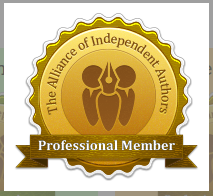|
A while back, I posted a review of 'The White Room' by bestselling thriller writer Martyn Waites. I'm delighted to welcome the man himself to my blog today. Here's our discussion: Tell us about your novel, The Woman in Black: Angel of Death.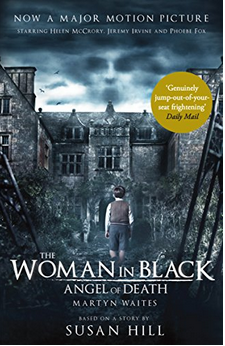 Well, it’s something I’m particularly proud of. At first I thought I was just going to be writing a film tie-in which I thought would be fun because I hadn’t done anything like that before. Also I’m a huge Hammer Film fan and to have my name and Hammer on the spine of a book was enough for me, really. Plus it was a complete departure from anything I had written before. The opposite of my usual stuff, really. But … then I was told this wasn’t just to coincide with the new film but was going to be the official sequel to the novel itself. And then I found myself in the papers answering questions. And then I realised I’d taken on quite a daunting task. But I wrote it and really enjoyed it. It’s different to the first one and different to the film as well. I saw it as my chance to use every gothic trope that I could think of, making homages to all the great writers and filmmakers who had so excited me. So Poe is in there, a bit of M R James, hopefully a bit of Terence Fisher . . . Great fun to write. Has your early career as an actor helped you with your novel writing? Do you see yourself returning to acting in the future? I don’t know. It’s probably a never say never thing. I have no plans to return to acting but I would listen to offers. However, I’ve been out of it for so long I doubt I’ll get any offers. Also, I used to love theatre; that was my real passion, more than TV or anything else. But the thought of committing myself to a long run now doesn’t really appeal. As to whether it’s helped in my writing: yes, I think so. I find creating characters for the page the same as creating them onstage. I use the same intuitive processes as I would as an actor. Find the voice, the look, the walk, etc. And also, I find dialogue very easy to write. I think that’s down to my actor background. Will you venture into any other genres? If so, which ones?I already have. I’ve ventured into music journalism. Great Lost Albums came out in 2014. It was a collaboration between myself, Mark Billingham, Stav Sherez and David Quantick. We spent years trying to track down albums that we had only heard whispers about, legendary albums that may never have even existed . . . No we didn’t. It was a comedy book. Mark and I were trying to entertain each other on a train one day when we were out on tour together. What would Morrissey’s great lost panto album sound like? What if Pete Townsend did a rock opera about a deaf, dumb and blind bingo caller called Bingo Wizard? What if Coldplay became IKEA’s resident house band? Those kinds of things. Just to entertain ourselves really. By the time we’d got back to London we thought we had a book there. So we roped in Stav, who is of course a brilliant crime novelist but also used to be a music journalist, and Dave Quantick who also used to be a music journalist but who’s now better known for writing for the BAFTA winning Harry Hill’s TV Burp, The Thick of It and the Emmy-winning Veep. Then it was just a question of coming up with fifty albums that made us all laugh. The book came out last autumn and despite being the funniest book ever written, kind of disappeared. So it was back to the day job. You also write as Tania Carver. How different is that from being Martyn Waites?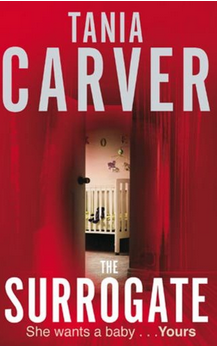 Well, there’s the name for a start. It’s interesting. Tania (if I can refer to myself/herself in the third person) is different from Martyn. The books are slightly different. They’re all crime novels but with the Tanias there are changes of emphasis, there are scenes that I wouldn’t put in a Tania that I’d keep for a Martyn. And vice versa. I don’t actually know what the differences are but I can feel them when I’m writing. I guess it’s like how it must have been for Donald Westlake writing as Richard Stark. The same, but different. Flexing different muscles, playing different chords. That kind of thing. Or at least that’s how I think of it. The other thing is writing under a female pseudonym. When the first Tania came out, The Surrogate, it was a massive bestseller, both here and internationally. I can remember standing in W H Smith where it was book of the week and watching people come in, pick it up and take it to the till. And of course I couldn’t say anything. Well, not without being forcibly ejected from the shop. I’ve got used to it now though. Tania is kind of my main writing at the moment. But doing things like Woman in Black and Great Lost Albums help to keep me and the series fresh. Tell us how American crime fiction of the Nineties influenced your early work.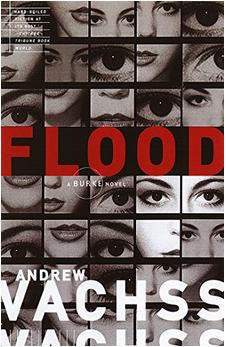 Wow, you’ve done your homework. Or you’ve heard me blathering on about this at great length, usually when I’ve had a drink. It was the late eighties and I was casting around for my ‘thing’. I was already acting and had what other people thought of as a promising career (which I think meant I was working and not unemployed). I loved reading and had tried everything but nothing seemed to stick, nothing spoke to me, moved me. Until I read Chandler. Then Hammett, then Ross MacDonald. Then James M Cain . . . and on and on. Actually this was in the mid-eighties when I was still at college. When I left I was still reading the old school stuff. I hated British crime writing at the time. Parochial, dull, boring. No connection with me or my life. Then I looked back at some of the neglected British writers like Ted Lewis, Gerald Kersh and, my favourite, Patrick Hamilton and wished we had people like that still writing. So I had a look at some of the American writing that was starting to appear then. And it was a pretty fertile time for it. Like punk and new wave happened over here in the late seventies and revitalised the culture, in the late eighties the same thing happened with American crime fiction. I read Andrew Vachss and it was like someone hadn’t just opened the windows onto a world, they had blown the side of the house off. James Ellroy next, then James Lee Burke, James Crumley, Walter Mosely, Sara Paretsky . . . wow. On and on. And that was when I realised I had found my thing. They wrote about urban landscapes I could recognise, about lives and struggles I could relate to. It was real life reportage, spat back as literature. And I couldn’t get enough of it. And then I thought (because I was already telling myself I was going to write a novel), why don’t I do what they’re doing? Transpose it for the UK but bring that energy, that sense of engagement the politics, the anger with it? Yeah, why not? I realised that quite a few other British writers were having the same idea at the same time. It just took some of us longer to actually get into print. But they were my literary touchstones, the ones who inspired me. You’ve held writing residences in prisons. Do you know if any of your students have published their work? How rewarding did you find encouraging offenders to write?I don’t know if I’ve actually led anyone to be a writer. There were some who were definitely good enough but I don’t know if they have or not. I worked as a writer in residence in a young offenders institution for two and a half years. Then for another year in an adult prison. To be honest, I could write a book on it. It was the most unique experience. It was the most polarised environment I’ve ever worked in. One day you’d be feeling like you could touch the stars, the next like you wished you were shelf-stacking at Budgens. Successes were stratospheric, failures equally so in the wrong direction. It was an honour to try and use my skills to effect a positive change in someone’s life. Tell us a little about the writing process for you. How long does an average novel take? How difficult (or not) are you to live with when creating a novel? Are you a planner or someone who writes by the seat of their pants?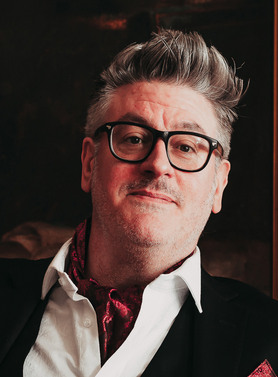 So many questions in that one question . . . Okay, here goes. I can answer the second bit first. How difficult am I to live with when I’m writing? Very. I sometimes put off starting a book because I know that it’s going to change me. It’s like you can never switch off and your mind is always on the work. At my best I’m kind of semi-detached while I’m working. At worst I’m the kind of writer that people go and stay with their relatives rather than be with. Do I plan or make it up? Kind of both, really. I know that sounds diametrically opposed, but it’s not. I usually start with an idea or an image. That then suggests questions to me. And it takes the course of the book for me to answer them. I usually say that the first hundred pages or so are like an audition. It’s me finding out who the characters are, why they’re there, what they sound like . . . all of that. And the ones with the most interesting voices are the ones I want to stick with. Then I can see a structure developing so I start to plan ahead a little. Maybe fifty or a hundred pages or so. Then after that, take stock and plan the next section. And so on. As for how long it takes, I don’t know. I try and allow myself a year to write a novel but always hope it takes less than that and I can fit something else in as well. But it varies. The longest it took me to write a book was five years. The shortest, three months. There are no hard and fast rules. And I also feel when I sit down to start the next book that I’ve learned absolutely nothing for my previous books. A blank screen is always a blank screen. And it’s up to me to be as creative as possible in how I fill it. Finally, tell us something weird and wonderful about yourself that your readers might not know.To be honest, I don’t think there’s anything weird - and certainly nothing wonderful - about me. I kind of wear my passions on my sleeve so most people know my politics, my interests, all of that. I can’t really think of anything. I’m a huge Doctor Who fan, right back to 1963. I love my pulp fiction, my horror movies, my film noir, my comics . . . possibly the only thing that not many people know about me is that I like modelling. Not on the catwalk, obviously, but making models. I’ve got a scale replica of Frankenstein’s monster and the Bride of Frankenstein from the film of the same name to work on next. I’m looking forward to that. Once I’ve finished my Doctor Jekyll and Mister Hyde model, that is. I enjoy it. The solitude, the concentration. You can listen to music while you work, which I can’t while I’m writing. And it uses another part of my brain to the writing part, lets me flex some other mental muscles. Love it. I used to win competitions for it when I was little. And that’s something not many people know. Thank you, Martyn! It's been a pleasure to talk with you.You can find out more about Martyn and his books, including the Tania Carver ones, via his website, www.martynwaites.com. Or you can connect with him on Twitter - @MartynWaites
1 Comment
I'm delighted to welcome bestselling crime novelist Tony Forder to my blog this week! Thank you for letting me interview you, Tony. Let's get going with the questions! I’d like to know more about your latest novel, the fourth in a crime series featuring DI Bliss and DC Chandler, called The Reach of Shadows. What can readers expect to encounter in its pages?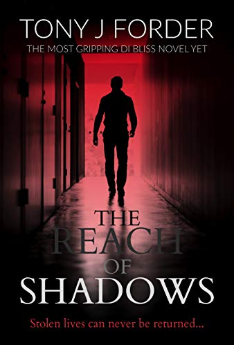 What readers will find is a Bliss under pressure physically, professionally and personally, with each of these looking to consume him. In fighting to solve a possible stalker-murder case whilst recovering from being mown down by a car, Bliss also has to ward off an IOPC investigation which focuses on the murder of his wife many years earlier. With help from a loyal team, Bliss resolves the murder in a way he might not have envisioned, and puts to the sword all of the questions asked about his involvement in his wife’s murder. Here's a taster: Recovering from injuries sustained in a road collision, DI Bliss is taken directly from hospital to a fresh crime scene and ordered to investigate the vicious stabbing and murder of Jade Coleman. When Bliss realises the victim had reported being stalked, and that two of his own team had been drafted in to take her statement, he is given the unenviable task of interviewing both of his detectives. Increasingly it appears that the stalker may be her killer. However, several other people soon become part of the team’s suspect list. Bliss also finds himself being questioned about his own past and has to battle to defend himself whilst continuing to investigate the murder. Soon more questions arise. Why would anybody target Jade Coleman? Why are the team unable to identify the victim’s close female friend? And why did Jade recently leave her job without any explanation? With his work cut out, and his team under pressure, can Bliss solve the case before more victims show up? Or will the shadows of his own past reach out and drag him under before he can succeed? What about your second Mike Lynch crime thriller, Cold Winter Sun, published in November 2018?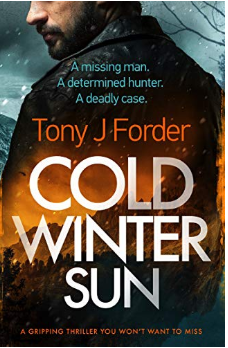 Mike, who in the previous book started out as a character worn down by life and striving to avoid hitting the bottle again, became the man he had once been across the course of that novel. In his second outing, he and his friend and comrade in arms, Terry, fly out to New Mexico to find someone important in his ex-wife’s new life. Hunted and plagued by people who appear to be seeking the same individual, Mike and Terry use their military skills to extricate both themselves and their target from harm’s way. Here's another taster: A missing man. A determined hunter. A deadly case. When Mike Lynch is contacted by his ex-wife about the missing nephew of her new husband, he offers to help find the young man with the help of his friend Terry Cochran. Arriving in LA to try and track down the young man, the pair are immediately torn away when the missing man’s car shows up, abandoned on the side of a deserted road in New Mexico. When two fake police officers cross their path, Terry and Mike know there is more to the case than meets the eye, and soon they find themselves asking exactly who it is they are really looking for… Tell us about yourself and what you get up to when you're not writing.I read, though not as much as I would like. I’ve played guitar since I was ten or twelve, and still practice most days – though I no longer have my fleet of guitars and equipment. I love music and listen as often as I can. I enjoy many sports, and follow Chelsea and the England rugby union team. I am now 61, live with my long-suffering wife in Peterborough, and I write full time. I love well-made films and TV, especially oddball stuff like Boston Legal, Fargo, Breaking Bad, Killing Eve, etc. What is your all-time favourite novel?The Silence of the Lambs. Thomas Harris recognised in Red Dragon the impact a villain like Lecter might make, and then added a beautifully observed character in Clarice Starling. Add suspense and tension in just about every scene, plus razor-sharp prose and dialogue, and you have a piece of magic. I loved Red Dragon as well, but for me Lambs just takes the prize. What are you working on at present?I wish I knew. I’m close to finishing my final edits for the next DI Bliss, and also working on a brand new story and character – my first female lead – but only recently had an idea for another Bliss book which I cannot stop thinking about and had to start writing immediately. I always have plans for 2-3 books ahead, and I always change them. I need there to be 48 hours in a day or for someone to clone me. Do you work to an outline or plot or do you prefer to see where an idea takes you?It entirely depends on the book at the time. My most recent release, The Reach of Shadows, began with two ideas: a possible stalker murder and an internal investigation against DI Bliss. It really was no more than that when I started, but it ended up being what I consider to be my best book so far. Conversely, with the book I am editing, slated to be the next Bliss, the entire story was pretty much in my head and significant incidents noted before I wrote a single word. It all came to me within about fifteen minutes, shortly after reading an article about a bizarre true-life murder in the US. I didn’t so much write about the murder itself, but instead used a similar incident here in the UK as the reason other murders take place. Do you think the cover plays an important part of the buying process? 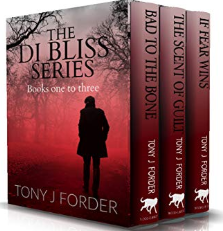 From what I’ve read, most people claim not to be influenced by covers. However, even with those who say it means nothing to them, I do believe they may be subliminally drawn to certain colours, fonts, and images. It may catch their eye without them even realising it, but there’s no doubt in my mind that readers can be drawn to a book by a cover. I don’t, however, believe they buy a book because of the cover. But being drawn to it can be enough, because that may then lead them to read the blurb and go on to buy it. What kind of research do you do?I actually enjoy research, and the volume and kind entirely depends on what sort of book I am writing. For Degrees of Darkness I had to interview a taxidermist, for my current DI Bliss book it I needed advice from an embalmer; prior to that, I’ve used a solicitor, a paramedic, and a variety of police organisation units. The Met, NCA and RAF have been extremely useful. Then there’s good old Google and Google Maps. I almost got caught out by the maps, though. In If Fear Wins I have DI Bliss visit a police station in Essex. I wrote a whole scene, part of which described the exterior which I studied in street view online. A week or so afterwards I read a piece that said the station had been closed down and the whole lot moved elsewhere – you forget how out of date those maps and views can be. How long do you spend on research before starting your book?I try not to write about anything about which I have a complete lack of knowledge, so I’d say I write the book with a general awareness and minimal research behind me, fill in some specifics during the first draft, but mainly add my research material via the edits. In full flow at the keyboard I leave notations inside square brackets where something needs checking or adding. What advice would you give to would-be novelists?Persevere. If you have imagination then you can pluck an idea out of thin air and turn it into a story, which means you must write as often as possible. Learn as you go, but produce. Nothing need be wasted, as it can all be revisited later, after which you can polish your work. I’m not sure everybody gets the fact that, as with most creative things, you have to actually learn your craft. You do that by writing, and although some writers claim not to read, I do think you also learn by reading. Certainly you can learn about structure and pace from reading. Finally, grow a thick skin, because when you present your work you must be prepared to be criticised. Thank you, Tony! Here's more information about Tony and his books: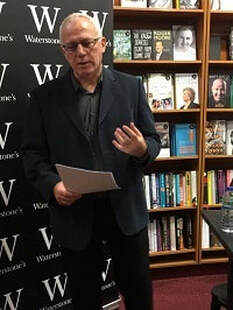 Tony J Forder is the author of the critically acclaimed, international best-selling crime thriller series featuring detectives Jimmy Bliss and Penny Chandler. The first three books, Bad to the Bone, The Scent of Guilt, and If Fear Wins, are now joined by The Reach of Shadows, published in January 2019. Tony’s dark, psychological crime thriller, Degrees of Darkness, featuring ex-detective Frank Rogers, was also published by Bloodhound Books. This is a stand-alone novel. Another book that was written as a stand-alone was Scream Blue Murder. This was published in November 2017, and received praise from many, including fellow authors Mason Cross, Matt Hilton and Anita Waller. Before it had even been published, Tony had decided to write a sequel, and Cold Winter Sun was published in November 2018. Tony lives with his wife in Peterborough, UK, and is now a full-time author. You can find out more from his website, https://www.tonyjforder.com/ Facebook: https://www.facebook.com/tonyjforder/ Twitter: https://twitter.com/TonyJForder @TonyJForder Amazon Author: https://www.amazon.co.uk/l/B01N4BPT65 Goodreads: https://www.goodreads.com/author/show/16166122.Tony_J_Forder Barnes & Noble: https://www.barnesandnoble.com/s/tony+j+forder?_requestid=248936 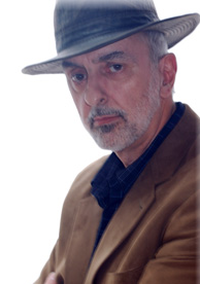 I'm delighted to welcome to my blog today Robert Bidinotto, author of the bestselling novel Hunter. Set in Washington, D.C. during a wave of vigilante killings, it’s the tale of two strong, idealistic loners. Dylan Hunter is a crusading journalist with a mysterious past, working to expose outrageous leniency in the criminal justice system. Annie Woods is a beautiful security officer at the CIA, sworn to track down the unknown assassin of an Agency employee. They meet after a brutal criminal act of violence against mutual friends. As the parallel investigations by the CIA and the police begin to intersect in surprising ways, Dylan and Annie fall passionately in love. But they don’t realize that the shocking secrets they’re hiding from each other are propelling them headlong toward shattering personal conflicts—or that a terrifying predator is targeting them both. I can vouch for the fact it's a great novel. Now, on with the interview... You say that the failings of the US legal system formed the basis for Hunter's plot. Will future novels incorporate other areas of interest to you, such as environmental issues? 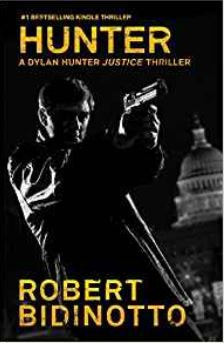 Maggie, my nonfiction background was writing serious journalism and commentary about current events and controversial topics. Now that I’ve turned to fiction, I find that I’m incapable of writing stories that do not have serious themes. Because I write thrillers, readers have every right to expect, above all, entertainment—colorful characters in fast-paced plots with lots of action, romance, and suspense. But in a Bidinotto thriller they also will find provocative perspectives on important topics. My goal is not only to keep readers turning pages late into the night, but also to encourage them to rethink the conventional “wisdom” on various topics. So, call these “thrillers for thinking people.” Let me stress that, in my stories, the action doesn’t grind to a halt while characters just sit around pontificating at each other. That’s boring. Instead, I weave important themes into the very fabric of the characters and plot. The conflicts, confrontations, suspense, and story resolution all revolve around the characters’ values and viewpoints. So, the reader’s emotional investments in the characters and their fates become part and parcel of the ideas. That was my approach in Hunter: it dramatizes corruption and leniency in the criminal justice system. But readers will find even more controversial themes in Bad Deeds. It’s set in the environmentalist movement—another long-time interest of mine. But let me assure you, my perspective is not “politically correct.” And the third novel in the series, Winner Takes All, tackles just about every political controversy that has emerged since the 2016 presidential election. It is the most complex story yet—and many readers think it’s the best. Let’s imagine a showdown between Lee Child’s Jack Reacher and your Dylan Hunter. Reacher has the brawn, but can he compete against Dylan Hunter’s brain? Tell us how Dylan Hunter would win! Ouch. First of all, I love the Jack Reacher character and have enjoyed most of Lee Child’s thrillers. Second, fictional characters—whether Lee’s or mine—can do pretty much anything the author wants them to; so Lee and I can always imagine and invent ways in which Dylan Hunter could defeat Jack, or vice versa. Now, if you’re asking about a physical confrontation between the very smart, very ruthless, and very large Jack Reacher, vs. the very smart, very ruthless, and considerably smaller Dylan Hunter—well, I don’t think the boxing commissioner would allow such a match. Both guys also fight dirty, however, and maybe Dylan would have a few tricks up his sleeve that Jack wouldn’t expect. Who knows? Either way, things would get bloody. If your question is about something more than a physical fight—well, I’m sure that Dylan, with his money and background, could come up with a lot of high-tech spy gadgets to even the odds. With its passionate love affair between Dylan and Annie, Hunter marries crime fiction with romance. Do you see yourself ever joining the growing ranks of male romantic novelists? Or perhaps exploring other genres besides crime/thrillers? Pure romance novels? Probably not. However, after I’ve given Dylan a good run, I do have ideas for novels outside the thriller genre. Stay tuned. To what extent has your interest in philosophy, in particular the Objectivist movement of Ayn Rand, influenced the character of Dylan Hunter? |
Categories
All
Subscribe to my blog!
Via Goodreads
|
Join my Special Readers' group and receive a free copy of 'Blackwater Lake'!
|
Privacy policy Website terms and conditions of use
Copyright Maggie James 2018 - current date. All rights reserved.
Copyright Maggie James 2018 - current date. All rights reserved.
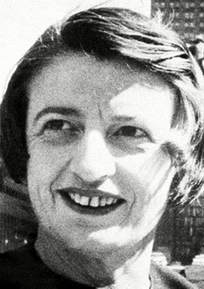
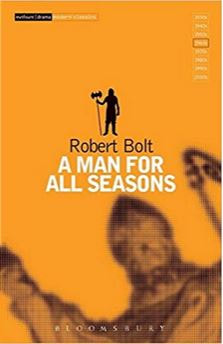
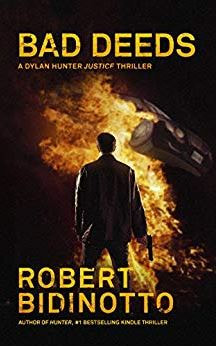
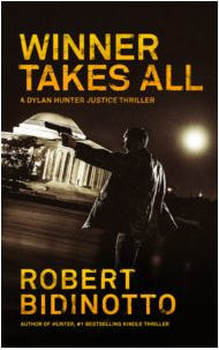
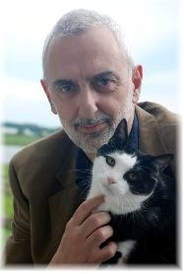
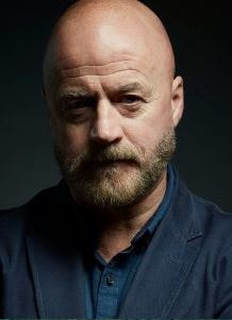


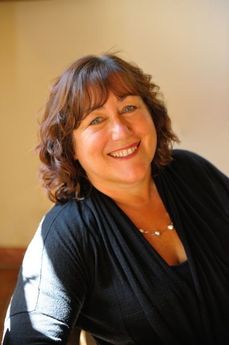
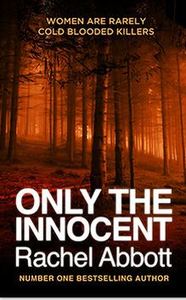
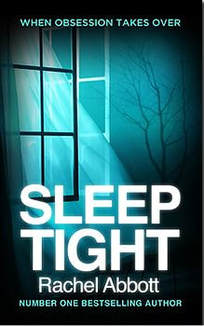

 RSS Feed
RSS Feed
